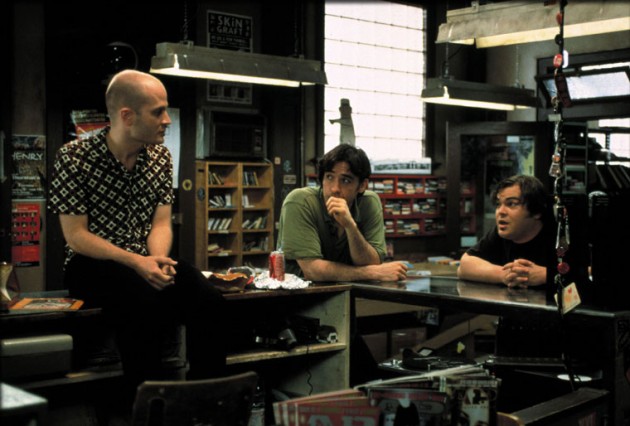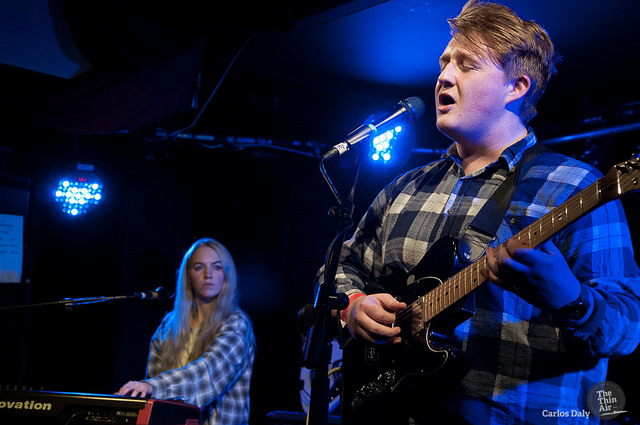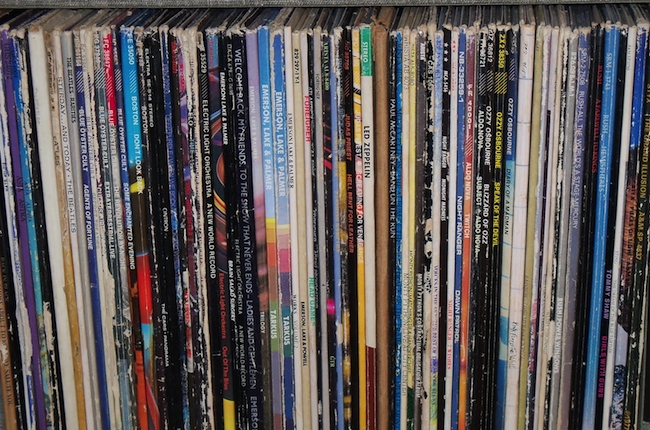For someone like me who has only ever had a passing interest in music-buying and hit puberty around Napster’s ascendance, the record shop as a location resided almost exclusively in the general cultural imagination as opposed to my regular routine. Inevitably my idea of what record shops and the people who work there were like came to align with the enthusiastic but elitist list-making devotion immortalised by Stephen Fears’ High Fidelity (2000), based on Nick Hornby’s 1995 novel, and brought to life by John Cusack’s world-weary shop owner Rob Gordon and his pair of ‘musical idiots’, played perfectly by Jack Black and Todd Louiso, for whom Championship Vinyl is both a workplace and a clubhouse. The idea of the record shop as a refuge, a place slightly out of kilter with the rest of the world, where diehard music fans and other sorts of misfits can find each other and themselves, is a theme that connects High Fidelity with the tonally dissimilar Empire Records, 1995’s teen movie flop turned cult favourite.
Both films have their own approach towards the record shop as a commercial and conceptual site – escapist, bright and inclusionary in Empire; gloomier, more antagonistic and self-centred in Fidelity – but what unites them is a sort of romantic idea about the space functioning as much more than a place to simply purchase musical objects. We can unpack that but let’s start with Empire Records, inspired by screenwriter Carol Heikkinen’s experiences working at Tower Records stores and directed by Allan Moyle, who had some cred speaking to outsider teen culture with his sleeper hit Pump Up The Volume (1990), in which Christian Slater’s pirate radio host enthralls the young and scandalises uptight parents and broadcast authorities.
A studio attempt to appeal to teens released close to, and totally overshadowed by, the box office-conquering Clueless (turned down by Empire’s production company,Regency Pictures) Empire takes place mostly during a single day of trading at the glossy but scruffy titular record shop managed by Anthony LaPaglia’s Joe Reaves. It’s got a ‘damn the man’ indie versus chain store skeleton plot: after closing up the night before and discovering plans to turn Empire into another franchise of corporate behemoth Music Town, oddball employee Lucas gambles away the day’s takings in a failed attempt to raise the money needed to save the store.
While Joe tries to give the run-around to the store owner, who’s sniffing after the cash, his gang of employees, drawn from every teen sub-culture of the time, prepare for the arrival of washed-up pop lothario Rex Manning (played with slimey gusto by Maxwell Caulfield), crooner of cheesy single ‘Say No More (Mon Amour)’. Meanwhile, the kids have their own issues to worry about: the romantic A.J. (Johnny Whitworth) pines over good-girl Corey (Liv Tyler), who’s planning to lose her virginity to Manning and is secretly jealous of her best friend Gina’s sexual experience (Renée Zellweger, never more fun or sexy), while Deb (Robin Tunney, giving pure fuck-you) deals with family problems and self-harm. All set to an alt-rock soundtrack.
As a recent convert to the strange pleasures of Empire Records I reached out to Hannah Devlin, my partner and Records super-fan, to gain a better understanding of why it has had such a long-lasting cult following, enough to inspire special outdoor screenings and an actual Rex Manning Day. Hannah, could the teenage you identify with its Breakfast Club-style motley crew of outsiders?
Hannah: I love Empire for so many reasons. Mostly because I would love to believe that such a store actually exists – with a sweeping staircase, ramshackle, arty back rooms, a vast collection of musical genres, and actual customers who come in and buy with regularity. Watching it now and comparing it to the failing Music Townesque shops we have (the impassive face of HMV and the personality-free Virgin) makes me long for a place like that.
I definitely identify strongly with the ‘motley crew of outsiders’ you describe. I have actually been that girl staring in the mirror and shaving her head, I have been (and still am) that person utterly despising Rex Manning and all he stands for, and I wanted so much to be that confident, outgoing, creative person who ultimately faces her fears and sings her fucking lungs out to save something she believes in. But I have to acknowledge the fact that I am identifying with characters in a film that was probably quite cynically put together to appeal to the masses.
We have a typical love story between an adorable (yet probably carefully costumed) artsy, cardigan-wearing, vulnerable A.J. and fuzzy-jumper wearing girl-next-door Corey for the girls, light comedy for the stoners from the clowns Mark and Eddie, a sexy, brash Gina for the red-blooded males, and for the outsiders (like me!), we have the intense, alternative Deb, the resident musician and mysterious figure Berko, and the delightfully strange Lucas.
Ten million quid was spent on this film. Ironic really, that a film about the ‘freaks and weirdos’ should have been the focus of so much mainstream investment. In a hateful, hipstery ‘they didn’t get it, but I do!’ way I kind of like that it was a flop. I fight that side of myself a lot, especially when it comes to discussing music – but in the name of authenticity, I have to admit it here.
Even if this had been a huge box-office success, I know I would feel the same about it because despite my acknowledgement of some typical Hollywood tropes, this film has real heart. Although almost all the actors are easily recognised now, when I watch it I still believe in the characters they portray. There is a very real, easy relationship between them all, and it draws you in. I didn’t know until today that the head-shaving scene was improvised – but maybe that’s what makes it so convincing. I love Robin Tunney, and to hear that she had such a commitment to her character that she would actually shave her head radiates an identification I feel from all the characters. Liv Tyler isn’t afraid to ‘cry ugly’ during her breakdown scene, and Renée Zellweger actually sings. The conversation between Eddie and Mark during the closing credits is one that I have had countless times, and I am fairly sure that the fuzzy, weed-induced indolence of both characters was only partly acted.
My favourite moments are Rex Manning’s music video, Lucas’s ‘the fat man walks alone’ line, the totally unexpected cameo by Gwar, the cringy moment when Corey reveals a ‘fuck me’ scarlet bra and white cotton granny panties, Rex’s refusal to sit on the magic eye chair and every time Mark looks directly into the camera.
Ultimately though this is a story about the authentic overcoming the inauthentic, and it does it really well. From the humiliation of the preening, satin-bloused Rex Manning to the highly unlikely, definitely dodgy ‘sale’ of Empire from a suited business man to the leather-jacketed Joe for a plastic keg of cash, the identification of what constitutes inauthenticity is made clear, and fantastically, the redemption of the authentic comes through music. Unlike you, music has always been a crucial part of my life, and the strong emotional connection I have to it means that I will probably always be a sucker for a film like this. These characters to save the place they love by staging a live gig. I mean, come on. This film was made for me.
Conor: The ‘authenticity’ angle is interesting. As a representation of the record shop environment, I think Empire is a messy mix of the particular and the fantastical. A lot of details, like the single daily veto everyone has over the store’s playlist or the staff ambivalence towards a visiting musician, feel drawn from real life. The film seems to capture something of what it would be like to be that age and working in a record store – and then amplifies it into escapist, good-time technicolour.
One thing that sticks out is how little people in the film actually talkabout music in comparison to the lemmings in High Fidelity where it is all they ever talk (mostly in list form). Characters in Empire talk about typical teen stuff like homework, college, parent trouble, suicide and crushes. Even Joe, the manager, seems only barely interested in the medium he’s selling, regarding the shop as primarily a surrogate home for the wayward youngsters under his eye.
You’re also right about customers – Empire’s production crew fill its spacious, custom-built sets with extras, recreating some sense of retail bustle. By contrast, Championship Vinyl is almost always empty. Apart from one scene where Jack Black’s Barry makes the hard sell to an Echo and the Bunnymen fan (Barry is actually a pretty good employee), it’s generally just the three boy-men, bickering and compiling and rolling their eyes at each other’s playlist choices. There is a level of sourness towards the general public that reminds me of Kevin Smith’s Clerks (1994), the seminal cinematic record of Gen-X wasting itself away in retail. As Clerks’ Randall complains, ‘this job would be great if it wasn’t for the fucking customers’.
You talked about identifying with Empire’s characters; when I watched High Fidelity as a comfortable but slightly alienated young man a larger part of me that I would like to admit identified with Cusack’s Rob Gordon and his air of hangdog, resigned superiority. Rewatching it now I see more clearly how much of selfish asshole Rob is, how prone he is to mythologizing and fatally resistant he is to personal and professional growth.
Pop cultural expertise is something I’ll always applaud, but like legions of frustrated young dudes who would have previously congregated in niche comic, record and video rental stores but now find solace in the anonymity of message boards and comment threads, Rob seems to wield his refined taste like a sword against the mediocrity of the rest of his life. His insistent top five-ing of music tracks and relationship break-ups acts as a barrier between himself and the world. The gloomy décor of Championship Vinyl reflects his internal dissatisfaction and the fetishizing of an out-dated format suggests stubbornness towards change and progress. Here the record shop is as a site of stagnation, not liberation.
It is easy to romanticise the precarious nature of independent record stores in the age of HMV and Amazon. But there is an assumption of impermanence built into each of the films. Both Empire Records and Fidelity take place during transition periods in the characters’ lives: adolescence and a mid-life crisis. This contributes to the sense of record shop employment as a rite of passage, a place of bonding and community that nonetheless encourages escape. In Empire A.J. is going off to art school; Corey to Harvard; Gina wants to be a singer. The stoner clowns might stick around, ending up like Clerks’aimless hangers-on Jay and Silent Bob, while another cycle of misfits find some solidarity and redemption on the Empire Records payroll.
In Fidelity it’s only when Rob pursues opportunities outside of Championship – starting an on-the-fly record label and renewing his disc jockey career – that he starts achieving some level of happiness and is able to use music to connect with other people rather than set himself apart from them. Even Barry’s band gets to surprise us in the end, abandoning the Sonic Death Monkey shtick and bringing the house down with Marvin Gaye’s ‘Let’s Get It On’. The opportunities to ‘be authentic’ and engage productively with the art we love tend to be wider and more numerous than we perceive. Sometimes a shop is just a shop. Conor Smyth





